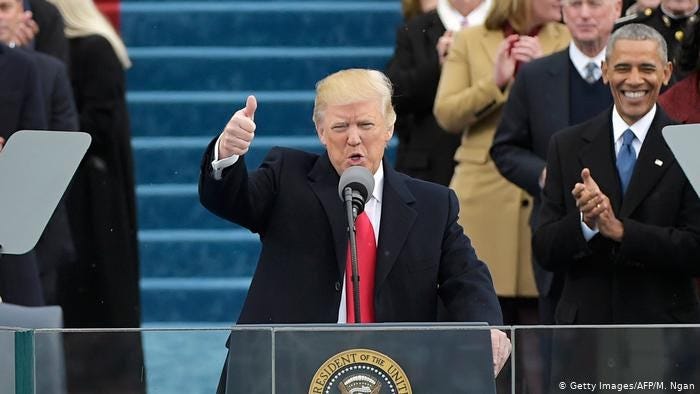Back Towards the Light
“We are not merely transferring power from one Administration to another,” said Donald Trump four years ago in his doom-laden inaugural address, “we are transferring power from Washington D.C. and giving it back to you, the American People.” Trump’s presidency began with a pledge to transfer power to the people and ended with a mob marauding the Capitol. Promises made, promises kept. Sort of.
Expect Joe Biden’s address to return to the politics of old. The 78-year-old will summon the traditional rhetoric Trump eschewed — hope, unity, America as the leader of an international alliance for good — in an effort to heal a wounded and exhausted nation. For all his talk of building back better, Biden’s political appeal lies in the prospect of a return to normality. That is his promise. Whether he is able to keep it, given the wild forces loosed by his predecessor, remains to be seen. (AD)
Crunching the Words
In Robert Schiller’s Narrative Economics, the Nobel laureate showed that certain words and phrases, repeated in the media and elsewhere, cause economic booms and busts.
There is much we can learn from political language this way too. I doubt you’ll be surprised to read that no President spoke more of America than Donald Trump in 2017 — every 40th word in his inaugural was “America” according to one data scientist. But you might be more surprised to see that Clinton ran him close in 1992, after a campaign in which he too claimed he would “make America great again”.
Saying that, no data analysis can do justice to just how genre defying Trump’s 2017 inaugural was. Trump was the first President to use words like “sad”, “bleed”, “stealing” and, of course, “carnage”. But then Obama in 2009 claimed the first coinage of “greed”, “grievance”, “icy” and “spectre”. While there are some things the data can tell us, there are others you still have to see to believe. (JW)
JARGON BUSTERS: Spads and Sunlit Uplands
In the crusade for clear language, we have no greater ally than the public. A YouGov poll in December offered yet another reminder of how little the jargon of British politics is understood by most Britons. Just one in ten could tell you what a “Spad” is. The same number could identify the meaning of “sunlit uplands”, a favoured phrase of our Prime Minister. “Levelling up”, another of his common refrains, means something to only a third of the nation. If the political classes wish to persuade, it is time they did so in plain and simple English. Saying that, in the meantime, ignorance sounds like bliss to me. (JW)
President of the United States of Stammerica
Joe Biden is the latest addition to the list of rhetorical stammerers. Demosthenes, whose name has become a by-word for rhetorical brilliance, stammered as a boy and practised by cramming pebbles in his mouth and declaiming speeches on the beach. There is a dispute about whether Winston Churchill had a stammer or merely a lisp. In either case, he struggled to get his words out.
The link between stammering and verbal abundance does appear to be causal. Aneurin Bevan, who was the finest speaker in British politics in the 20th century, gained his voluminous vocabulary as a defence mechanism. Bevan used to walk round the hills in South Wales with a copy of Roget’s Thesaurus taking in the synonyms and verbal alternatives that would allow him to get round a word he knew would cause him to stumble.
Prolific director Jonathan Miller had a similar technique, as he explains in this fascinating exchange with Dick Cavett. The fear of his stammer, says Miller, caused him to become a “very skilled paraphraser”. Miller says pretending to be someone else is an effective strategy for combating a stammer. Public rhetoric is an act of playing someone else who just happens to be yourself. Neither Churchill nor Bevan stammered on the stage (though Bevan did so on purpose every now and then, for effect).
Joe Biden is renowned for his verbal excess. A former speechwriter of his said that Biden was the only politician you had to subtract words from rather than add them to. The fluency is, at least in part, about the fear of coming to a juddering stop. (PC)
Jargon Buster in Chief
Joe "will you shut up, man?" Biden is a fellow combatant in the war on jargon. In meetings, the president-elect reportedly calls out aides for what he deems academic and elitist drivel. "Pick up your phone, call your mother, read her what you just told me", he instructs, "if she understands, we can keep talking". Corporate executives the world over would do well to heed his ancient wisdom. Hail to the Jargon Buster-in-Chief. (ZH)
BOOK REVIEW: Every Drop of Blood by Edward Achorn
The story of Lincoln’s second inaugural address is told with the urgency of a thriller in Edward Achorn’s new book, a vivid telling of the speech, the era, and those watching in Washington that day, from John Wilkes Booth to Walt Whitman.
Now etched onto one wall of Washington’s Lincoln Memorial, the address was a masterclass in brevity at just 698 words. Confronted by division that puts America’s contemporary polarisation in the shade, Lincoln sought to bind the nation, “with malice towards none, with charity for all.” Drawing often from the Bible, he framed the Civil War as America’s punishment for the sin of slavery, and a fair one, even if “every drop of blood drawn with the lash shall be paid by another drawn with the sword.”
It was one of the great nearly moments of history. The Union would win the war days later, with Reconstruction of the Confederate South set to unite the nation and put slavery firmly in its past. But with Lincoln’s death, his noble ideals died too. His successor, Vice President Andrew Johnson (who delivered his own, rambling, inebriated address on the day of the inauguration), allowed Reconstruction to falter and fail. It would take a hundred years for Lyndon Johnson’s Civil Rights Bill to enforce the rights won in the Civil War. And the divisions of 1865 are still with us today, evident not least in the extraordinary image above: a pro-Trump protestor striding through the Capitol, the Confederate flag fluttering over his shoulder. (JW)
Language and beyond
The Economist’s Bartleby imagines a corporate missive written without a shred of jargon - a must read for every business leader. (£)
The FT’s Leo Lewis writes of the mysterious disappearance of Chinese billionaire Jack Ma and the “calamitous address” that was at its root. (£)
William Boyd with a frank appraisal of John Le Carré’s prose style.
Trump may be awful but he is not, strictly, a fascist, says Cambridge history professor Richard Evans in this interesting piece.
A Cato Institute article argues Twitter and Facebook bans will do little if politicians and broadcasters voice far right ideas every day on TV.
Incredible reporting from Axios on election night at the White House, with interesting insights into Trump’s speech-writing process, if you can call it that.
Linguistics experts show how Trump’s language escalated between election day and the Jan 6 Capitol riot.
A fascinating extract from a Churchill speech on landlords.
“He dressed like a janitor, swore like a sailor and spoke Latin with the riverine fluency of a Roman orator” - The fascinating life story of Father Reginald Foster, one of the world’s great Latinists, who died recently.
An interesting chat with Carlos Lozada, the Washington Post’s Pulitzer-winning critic, on the avalanche of Trump books published in the last four years. Poor Lozada read them all, and has now written his own, What Were We Thinking: A Brief Intellectual History of the Trump Era.
New from us
Phil analyses Trump’s fateful speech to the crowd that would storm the Capitol on 6 January.
Phil in the New Statesman on what Biden should say tomorrow.
Follow us
@PhilipJCollins1 @joshuahwilliams @AlexDymoke @zachdhardman
One last thing…
At The Draft we’re specialists in writing and rhetoric. We help businesses and public figures make their case more persuasively. If you could use our help, get in touch. And if you enjoy First Draft, forward it on. Thanks for reading.




